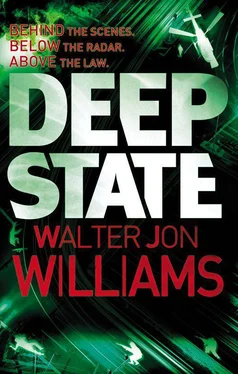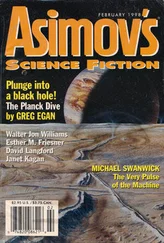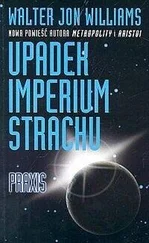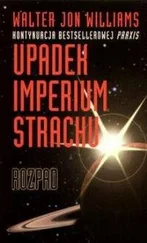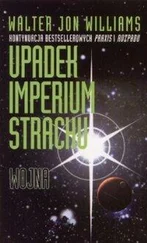Walter Williams - Deep State
Здесь есть возможность читать онлайн «Walter Williams - Deep State» весь текст электронной книги совершенно бесплатно (целиком полную версию без сокращений). В некоторых случаях можно слушать аудио, скачать через торрент в формате fb2 и присутствует краткое содержание. Жанр: Киберпанк, на английском языке. Описание произведения, (предисловие) а так же отзывы посетителей доступны на портале библиотеки ЛибКат.
- Название:Deep State
- Автор:
- Жанр:
- Год:неизвестен
- ISBN:нет данных
- Рейтинг книги:5 / 5. Голосов: 1
-
Избранное:Добавить в избранное
- Отзывы:
-
Ваша оценка:
- 100
- 1
- 2
- 3
- 4
- 5
Deep State: краткое содержание, описание и аннотация
Предлагаем к чтению аннотацию, описание, краткое содержание или предисловие (зависит от того, что написал сам автор книги «Deep State»). Если вы не нашли необходимую информацию о книге — напишите в комментариях, мы постараемся отыскать её.
Deep State — читать онлайн бесплатно полную книгу (весь текст) целиком
Ниже представлен текст книги, разбитый по страницам. Система сохранения места последней прочитанной страницы, позволяет с удобством читать онлайн бесплатно книгу «Deep State», без необходимости каждый раз заново искать на чём Вы остановились. Поставьте закладку, и сможете в любой момент перейти на страницу, на которой закончили чтение.
Интервал:
Закладка:
“I don’t think the junta’s going back to the barracks,” Lincoln said. “Their profits are too big, and they’re finding life pretty easy right now.” He gestured toward the booming vastness of the sea. “Bozbeyli and his gang are the last of their kind-Turkey’s right on the verge of becoming a glorious twenty-first-century success, and I don’t want it devolving into a narco-terrorist state on NATO’s southern flank. So that’s why we’re here.”
“Yeah, well,” Dagmar said. “I’m good with all that.”
“I’m simplifying enormously,” said Lincoln.
“I figured.”
“And besides,” Lincoln said, “what we’re going to do is genuinely cool.”
Dagmar nodded. “I got that, too.”
How many people have to die, she wondered, before it all stops being cool?
The jukebox in the officers’ club was playing Carl Perkins’s “Dixie Fried.” It was the end of Happy Hour and the place was full: Dagmar and her crew hadn’t been able to get a large enough table, so all six were clumped around a small, round table barely large enough to hold their drinks.
Ismet, Tuna, and Rafet had returned after four days on the other side of the Green Line, working there with the camera teams and the Anatolian Skunk Works. Judy and the Turkish-speaking intern, Lloyd, had also come along. Rafet and Judy were sipping their soft drinks; the rest had lager.
Dagmar looked at Ismet and Tuna.
“Have you been working for Li-for Chatsworth all along?” she asked.
Ismet seemed surprised by the question.
“You mean, during the Stunrunner game?” he asked.
“Yes.”
“No. We got recruited later.”
Tuna put a big fist around his pint glass. “I think, uh, Chatsworth decided we were politically sound.”
Certainly, Dagmar thought, during Stunrunner they had both demonstrated opposition to the regime. And they knew a lot of people and could bring other recruits into the scheme.
And, of course, that meant no highly trained Company employee would be put at risk: only Turkish natives would be in danger. They were completely expendable. It was this realization that made Dagmar feel as if her ribs were closing in on her heart.
“My boss was willing to let me take leave,” Ismet said. “He’s not doing that well anyway, since firms with contacts in the government are getting most of the business.”
Dagmar cast a glance at Judy and Rafet: they seemed to be having a quiet conversation on their own, inaudible over Perkins’s vocal. She turned to Lloyd.
The Air Force Brat was a quiet dark-haired young man, dressed in a soft chambray shirt and cords.
“How did you learn to speak Turkish?” she asked.
Lloyd seemed a little surprised to be included in the conversation.
“I’m, uh-not sure I’m supposed to tell you.”
“He speaks with an American accent,” Tuna offered.
“Well,” Lloyd said. “My father is from Turkey, but I was born in the States.”
“Do you have dual citizenship, then?” Dagmar asked.
“I have a Turkish passport,” Lloyd said, “but I’ve never used it.”
He was so clearly uncomfortable with the questions that Dagmar decided to change the subject. She looked at Ismet.
“You said your grandmother was raised a nomad,” she said.
Ismet adjusted his spectacles. “Yes. She was a Yoruk. There are nomads in Turkey, even now.”
“Why do they… do what they do? Keep on the move?”
“They follow their herds. In the winter they’re on the south coast near Konya-actually most of them now have regular winter houses-but in the summer the sun cooks the grazing, so they move up to the high pastures in the Tauros Mountains and live in big black goatskin tents.” He took a sip of his lager. “They’re very poor, but then they need very little they can’t provide for themselves.”
Lloyd spoke, surprising Dagmar.
“Some nomads,” he added, “travel because they’re poor-they don’t own any land of their own; they have to keep on the move, and graze their animals on the highway right-of-way or places that no one actually owns.”
Dagmar remembered that this was a country where every city was surrounded by illegal settlements, lived in by poverty-stricken refugees from the country. She turned back to Ismet.
“And your grandmother married out?”
“She had an arranged marriage with the son of a merchant. The son was able to give the Yoruk access to things they needed, and the Yoruk provided the merchant with a steady supply of cheese, butter, hides, kilims, and so on.”
Dagmar asked if he still had nomad relatives.
“Yes, certainly. I used to visit them during my school breaks.” He gave a nostalgic smile. “That’s really the old Turkish lifestyle, isn’t it? Living in a tent, lying on carpets, eating meat and cheese and milk, cooking everything on a brazier. Our ancestors lived that way for thousands of years.”
“Sounds like an ideal vacation for a boy.”
Ismet shrugged. “I didn’t appreciate it as much as I should have-I missed my rap music and the Internet. And I’m afraid I was bored looking after the sheep.” He smiled again. “I enjoyed riding the horses, though. I’d shoot my toy bow from horseback and pretend I was a Gazi.”
“I’d like to meet your nomad relatives,” Dagmar said.
Ismet absorbed this with interest, eyes bright behind his spectacles.
“Once the generals are gone,” he said, “I’d be happy to introduce you.”
“I wish I was up in the mountains now,” Tuna said. “It’s so bloody hot here.” He pressed his pint glass to his forehead but then took the glass away and scowled at it-the lager, not very cool to begin with, was by now room temperature.
“At least you’re getting away from Akrotiri now and again,” Dagmar said. “I’m tired of being cooped up here within smelling distance of the runway.”
“If you have free time,” Ismet said, his eyes still bright, “I have a car. I can take you out to see the sights.”
Dagmar felt a warm current of pleasure at the thought of Ismet and his car and the whole Island of Aphrodite to lose themselves in.
“Are you all right,” Dagmar asked, “here on the Greek side of the line?”
Tensions at the moment were high. Cyprus was still divided into the official, UN-recognized Greek south and the Turkish north, the latter of which since the invasion of 1974 had been organized as a republic recognized only by Turkey. Persistent attempts to solve the crisis on the part of the UN and the EU had resulted in a certain softening of attitudes: the situation hadn’t been resolved, but it had grown more blurry, more complex, more nuanced.
But General Bozbeyli’s regime had hardened things again, had thrown all of Cyprus into stark light and shadow. Though the situation technically hadn’t changed, though no agreements had been abrogated, a series of belligerent proclamations by the military government had heartened the Turkish nationalists and driven the Greeks into a frenzy of resentment. Both sides were demonstrating. No one was brandishing guns yet, but it was clear that guns could be brandished, that shots could be fired, armies and navies mobilized, the whole of the region brought into bloody chaos.
Was that to Bozbeyli’s advantage? Dagmar wondered. Would he start a war if he felt threatened?
It was all too easy to see disaster looming everywhere she looked.
“I’ll be all right,” Ismet said. “I can pass for an American. And of course I’ll be with you, and-” His smile brightened. “If I get into trouble, you can rescue me.”
Again Dagmar felt that tingle of pleasure at the touch of Ismet’s brown eyes.
Tuna leaned forward over the table, his big fist dropping his empty lager glass on the table. Dagmar turned to him.
Читать дальшеИнтервал:
Закладка:
Похожие книги на «Deep State»
Представляем Вашему вниманию похожие книги на «Deep State» списком для выбора. Мы отобрали схожую по названию и смыслу литературу в надежде предоставить читателям больше вариантов отыскать новые, интересные, ещё непрочитанные произведения.
Обсуждение, отзывы о книге «Deep State» и просто собственные мнения читателей. Оставьте ваши комментарии, напишите, что Вы думаете о произведении, его смысле или главных героях. Укажите что конкретно понравилось, а что нет, и почему Вы так считаете.
